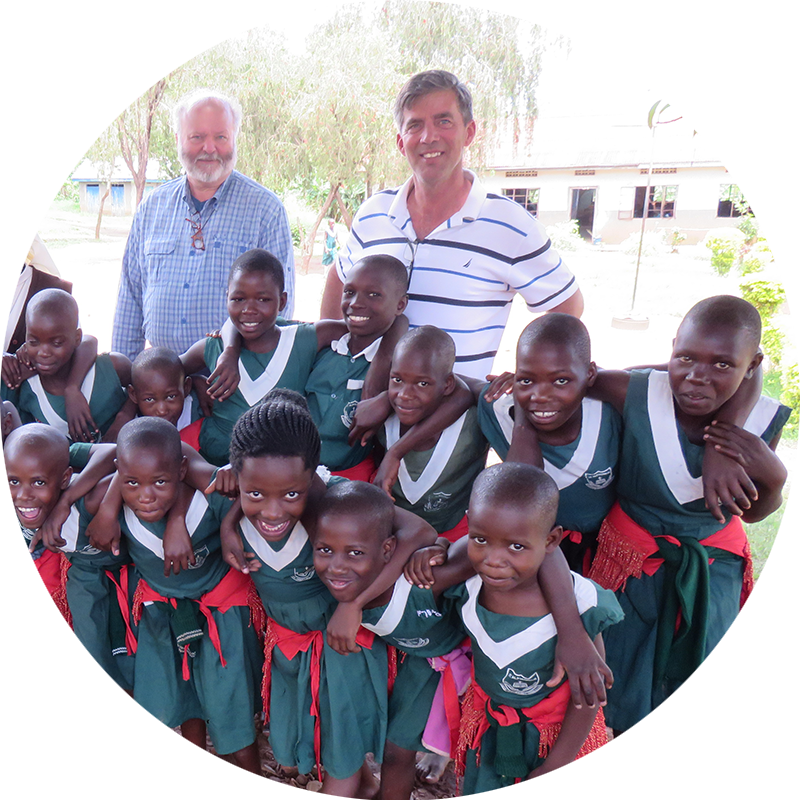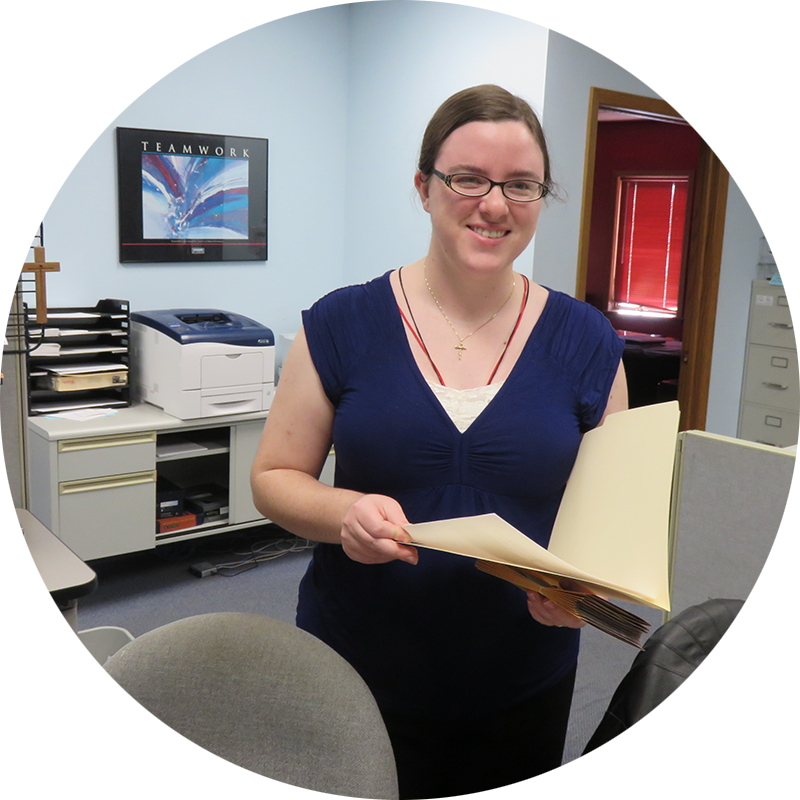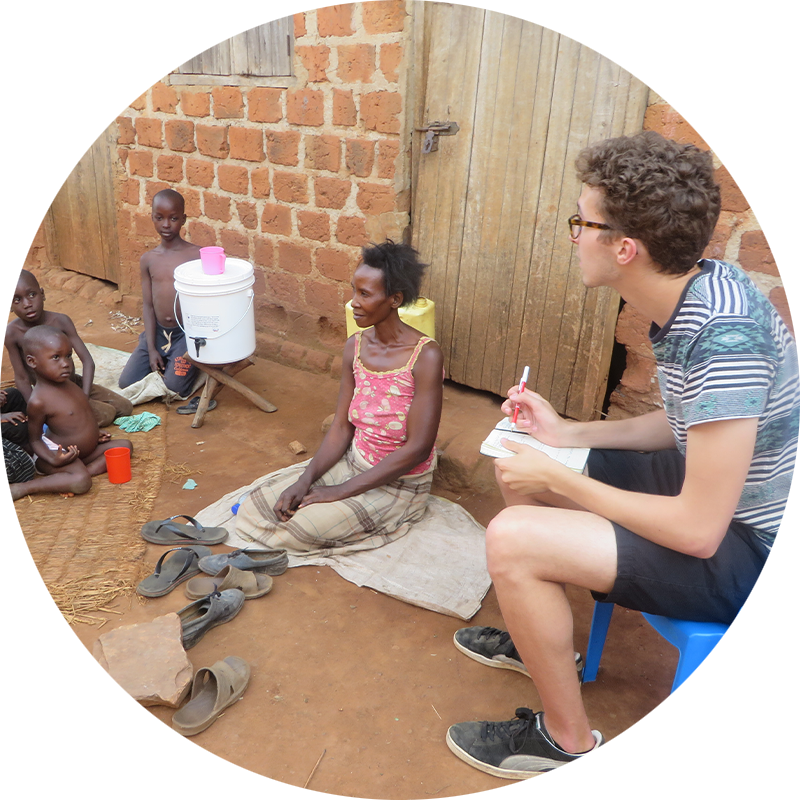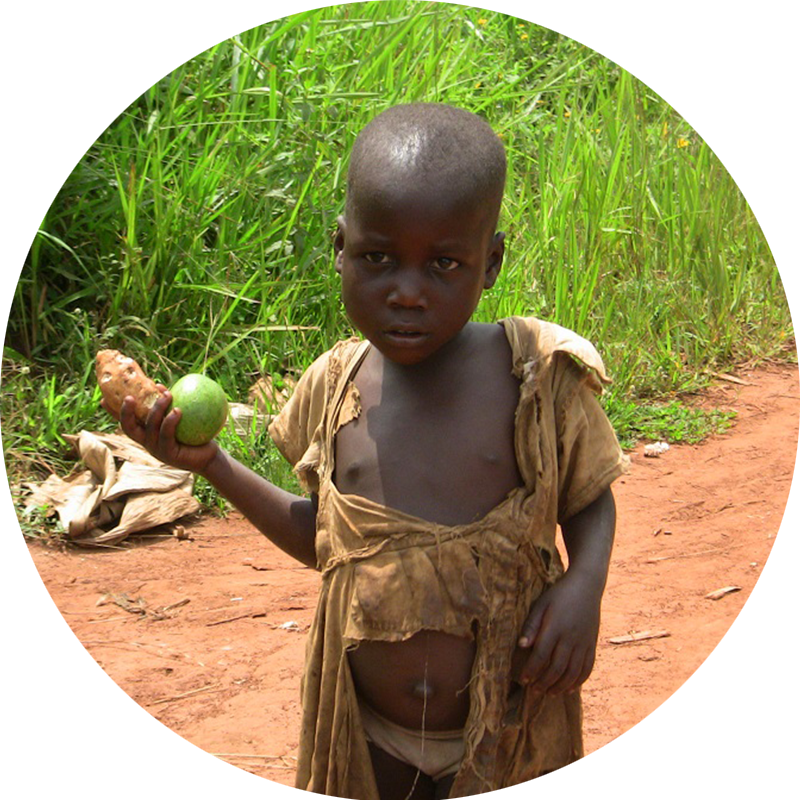The Beginning of CARITAS For Children
You can read the full story of Chris and Barbara’s early journey beginning with their personal child adoption story, our connection with Catholic Charities, and the founding of CARITAS For Children in the 3 parts below.
Part I: Adoption of "Our Children" from Poland. Our Personal Experience
My wife, Barbara (Mikulski) and I began our lives together in 1980. We had settled into our Wisconsin home in 1995 and had recently acquired our company. While I had three wonderful adult children from a previous marriage we wanted to share our lives with a child. Because adoption of children for people over age 40 in the USA is more difficult, our social worker from Catholic Charities of the Archdiocese of Milwaukee said, "Go international. "But where to go? How to start? Who to ask? Catholic Charities only offered domestic adoptions services. We'd have to conduct our international adoption process independently. We'd heard it was possible.
We began searching the Internet and researching in libraries. We had seen many advertisements about adoption from countries around the world, and we were especially interested in European countries. It was possible to adopt from Poland, we learned, not easy. But possible. And after all, Barbara was fluent in the language and still had relatives in Poland. So we concentrated on Polish adoption and became determined to adopt a Polish child.
Having three girls already, our first choice was to find a boy, preferably between the ages of 3 and 5. But first we had to gain approval from our State and Federal Government officials, through a Home Study and background investigation. We were told we should consider getting pre-approved for two children, because there are more sibling groups of the age of children, we agreed to consider, in Poland than single children. We started this process May of 1997 and by September, we had a complete dossier assembled, stamped by the Consulate General of the Republic of Poland in Chicago and in the hands of Mrs. Elóbieta Podczaska, Director of the Public Office of Adoption and Care (POAO) in Warsaw, for official review and approval.
At the same time, we planned to visit my wife's relatives and Mrs. Podczaska in Poland. We were in Poland in 1994 for pleasure, and Barbara had been back several times since immigrating at the age of 8 with her family from Sochaczew to Chicago in 1961. While there, in November 1997, we were approved to be matched with children free for international adoption. But this was still only the beginning. Our adoption process was an emotional roller coaster ride taking us from extreme exhilaration to deep depression. It was much different than what I experienced with the natural birth of my girls. If there is such a thing as being on a mission from God, adopting children must qualify for such a mission. It requires complete commitment of heart and soul.
Mrs. Podczaska immediately offered us a family of four children to consider, but we decided four would be too many for our stage of life. We would wait for the POAO to look for one or two children, and one must be a boy. After our trip we stayed in touch and made contacts with anyone knowledgeable in Polish adoption. There are several Orders of Women Religious with Polish roots in the Chicago and Milwaukee areas, including the Missionary Sisters of the Holy Family. We contacted them and by March 1998, the blessings of God were shining upon us. Fr. Jerzy Sermak, S.J., now living back in Poland, referred us to Sister Lucinda, an American Provincial member of the Little Servant Sisters of the Blessed Virgin Mary, Immaculate Conception. She contacted a fellow member of her Order in Czestochowa, Sister Rafaela who had two children who might fit our request. After getting permission from Mrs. Podczaska, we received a two-year-old picture of a sister and brother. She was 7 and he, about to be 6. Within a fairly short amount of time, we agreed to go to Poland and meet them, with the hope that we would be meeting our children to be.
It was May 10, 1998, Mother's Day in America, a beautiful warm spring day in Czestochowa. We arrived at the Dom Maych Dziecka in Czestochowa. There to greet us were Sister Rafaela, Sister Jadwiga and Sister Iza. Sister Rafaela told us that we'd be introduced at first as Auntie and Uncle until we determined whether we wanted to accept these children. Excitement and something so very special was in the air. All the children were preparing for visitors.
We spotted our daughter first, then our son. It was hard to contain ourselves. The day was perfect. The feeling of love and compassion was immediate. The fear of what we were committing to do was real but we had to press on. There was a feeling of hope that was so deep we felt it had to be the Holy Spirit guiding us. We played with the children, talked with the sisters, took in the sights of the Dom Dziecka with all its colors and other children. We were being fully absorbed into the atmosphere of the holiest city in Poland. Within one hour they were calling us Mama and Tata and haven't stopped since.
If you've ever been to Czestochowa in the month of May, you know how special a time it is in the year for Catholics. May is the month when we especially venerate the Blessed Virgin Mary. During the next two weeks, we stayed in Czestochowa visiting our children to be, getting to know them and they us, learning about the systems of social care in Poland, meeting other children at Sister's place and becoming deeply aware of the ongoing needs of orphans in Poland. We spent hours discussing these ongoing needs with Sister Rafaela, thinking, ?we must do something. Our children would be well provided for, but what about all these others left behind?
Seeing these beautiful, loving children of God who have been deprived of their natural parents, made us think of the hard-learned lessons of our faith. Beyond adopting our two beautiful children, Barbara and I felt we had to do something else to help these children and others like them. It was hard to describe the feeling, one might say it felt like a calling. We continued to think about it and pray about it, to figure out just what it meant for us.
But first, we had to get our children adopted and home. After our first two week visit, we did return home to await the due process of the Polish court system. At the end of June 1998 we finally got the word, we were back in Czestochowa in July for the first of two court dates. In early August, we were home with our children in Milwaukee to begin our lives together as a forever family. Mission accomplished, we had our children, our home was changed for ever, never to be the same again. God had blessed us abundantly. And while we could have been content to live out our lives together, without another thought for those left behind, something else happened in Czestochowa. We still had resources left and there were still needs to be fulfilled.
Part II: The Catholic Charities of the Archdiocese of Chicago
My wife Barbara and I described a special feeling coming over us during our adoption from Poland process in the first part of our story. Some would perhaps say it was the Holy Spirit calling us to do something we would not have ever considered possible. It was gradual and it wasn't clearly spelled out. We knew we were being called to help the children we met in Poland and others like them in some very special way.
Shortly after we began our adoption process, we met with our friend, Rev. Michael M. Boland, administrator of Catholic Charities of the Archdiocese of Chicago. We knew about the work of Catholic Charities, including one of its core missions, the adoption of children. Ironically the organization had just committed to the creation of an International Adoption program beginning in Mexico City, Mexico. Fr. Boland was intrigued with our adoption story and our desire to help other Polish children. He invited us to consider fulfilling our mission in conjunction with the resources of the Catholic Charities of Chicago.
Our first step was to discuss the possibilities with Sister Rafaela Marek in Czestochowa. Catholic Charities wanted to set up a program to adopt children from Poland. After all, outside the city of Warsaw, Chicago was home to more Polish people than anywhere else in the world. At the conclusion of that meeting, Sister Rafaela agreed to travel to Warsaw to discuss the ideas with Mrs. Podczaska from the Public Office of Adoption and Child Care (POAO) to see if she agreed.
Soon after we completed the adoption of our own children, we arranged for Fr. Boland to meet with Mrs. Podczaska in Poland in early October 1998.
Fr. Boland told her about the 81-year-history of Catholic Charities in Chicago and its ongoing adoption efforts, and Mrs. Podczaska answered Fr. Boland's questions about the conditions in Poland and about the availability of children in the orphanages. With great candor, Mrs. Podczaska told Fr. Boland the first obligation of her office was to support the adoption efforts of children to Polish citizens in Poland. Then, after all efforts to find good homes throughout Poland for Polish orphans within a reasonable time were exhausted, they would allow children to be made available to families in other countries. She also said they preferred that children to be placed in legally qualified homes of Christian parents with Polish ancestry who would try to preserve the Polish heritage of the adopted child. It was not mandatory for the couple to be of Polish ancestry, but many courts throughout Poland strongly preferred them to be, she said.
With a deeper understanding of the challenges, Fr. Boland affirmed Catholic Charities' commitment to develop a high quality international program for children to be adopted from Poland. From there, we took the train to Czestochowa to visit the Dom Maych Dziecka, then under the direction of Sister Rafaela Marek.
Returning to Czestochowa was special for us. We were among many of the children that had spent nearly five years with our children. Auntie! Uncle! Came the cries of several who remembered us. And we remembered almost all of them by name. It was a tearful and exhilarating reunion for us and we were happy to have Fr. Boland there to experience the feeling with us.
The feeling or calling, whatever one wants to name it, came flowing through us more strongly than ever. To be in the presence of these loving children, to be with Sister Rafaela and all her people and to feel their love and caring for these little children is just so difficult to describe. And as a special treat, Sister arranged for Fr. Boland to celebrate Mass in the chapel of the Blessed Mother of God at Jasna Góra, where I too was blessed to recite the readings of the day.
The next day, we returned to Warsaw to begin our trip home, more resolute than ever to build our program to help children become adopted from Poland and to serve those who could not be adopted, whether in Poland or in the USA. Within a few weeks after returning home, Catholic Charities held its annual board of advisors meeting. I was honored to be asked to join that board. At the meeting, I was especially pleased to hear Fr. Boland tell the over 350 people gathered about our trip to Poland and the plans to develop its International Adoption for Americans wanting to adopt from Poland.
In the ensuing months, Catholic Charities developed internal resources to promote its newly developing Polish Adoption program and to accommodate the intake of families that would be requesting information and services to adopt from Poland.
It all seemed painfully slow to me, after all, children were waiting for parents to adopt them. But to assure that proper measures were being taken, one must be thorough. It was time to return to Poland for a second visit. This time, Fr. Boland sent an adoption leadership team, including a newly hired native Polish social worker, Anita Groll. Barbara and I agreed to travel with them to Poland to meet all of the agencies then empowered to authorize International Adoption of Polish children.
It was an exhausting few weeks for us, full of anticipation, travel to several orphanages, conversation into the late hours of the evenings, meeting many people, telling and hearing the stories of need and learning too about the good, but still needy, social systems, compared to other countries, that do exist in Poland. The adoption leadership team of the Catholic Charities returned home with the first hand experience of the country, Polish orphanages and people they will be working with.
In March of 2000, Barbara and I returned once again to Poland, this time with our children. We met with many of the same people from the previous two trips, continued to reaffirm the commitments we had made and met the new Catholic Charities liaison in Warsaw. Having conducted our own adoption independently, without the benefit of a liaison, we can appreciate how important her role to families will be.
While it costs money to have trained people work with potential adoptive parents, conducting background checks, and interviews with prospective parents, Catholic Charities also wants to make adoption affordable to as many people as it can. In its many years providing adoptive services, Catholic Charities has always done its best to be the one place a family can go to, when all others would or could not help. It can only do so with the help of others. In part three, read about the creation of that support to help keep Catholic Charities' costs down and to provide direct support to needy orphans and orphanages in Poland.
Part III: The Founding of Caritas For Children
Caritas For Children promotes, encourages and provides support and financial assistance for the health, education and general welfare of orphaned and disadvantaged children. Caritas For Children will promote the support of adoptions, sponsorships of individual children and provide other direct or indirect means of fostering aid and assistance for orphans and other disadvantaged children in Poland and elsewhere. The primary support will be in collaboration with various Orders of Religious Men and Women throughout Poland, charged with the care of children of all ages. In the USA, Caritas For Children will provide financial and consulting services directly to Catholic Charities in Chicago and elsewhere in the USA.
Caritas For Children has built this web site to provide information about adoption in Poland, its history, its current situation, the process of adopting from Poland and stories about experiences of families who have adopted from there. It is hoped that the web site will provide a conduit through which individuals wanting to get connected with the appropriate individuals to help them conduct their adoption, make donations or simply communicate ideas or other forms of resources to help Caritas For Children fulfill its purpose. One of the pages on the new Web site focuses on the historical aspect of Polish orphanages. We were moved when we first spotted the edifice of a piece of scripture ensconced over the main entrance of the Dom Dziecka in Warsaw, first created in the 18th Century from the Book of Psalms 26:10. It is written in the archaic Polish script with the words, "Oyciec móy y matka moia opuscili mie, Ale Pan przyial mie" (which we are translating into English as: "My father and my mother abandoned me, but You Lord took me in").
We plan to employ several methods of fund raising. The primary method will be through the sale of vehicles donated as tax-deductible charitable contributions. In the USA, an individual can donate a vehicle to a non-profit organization and claim a deduction on taxable income equal to the fair market value of that vehicle. Many prominent non-profit organizations in the USA use this method.
Caritas For Children will also employ other fund-raising methodologies, including: special events, periodic contributions for orphaned children who can be individually connected to families in the USA as financial sponsors, donations from corporate sponsors, planned giving and major gifts to be used to further the purpose of Caritas For Children.
Caritas For Children hopes to help expand the building and capability of Dom Maych Dziecka im. Edmund Bojanowski w Czestochowie. We recently told Sister Rafaela this expansion was our personal gift for all the sister's hard work and years of dedicated service to children. Her Order, the Little Servant Sisters of the Blessed Virgin Mary, Immaculate Conception is particularly committed to the welfare of children. To my wife and me, she represents a person of exceptional compassion and dedication to her humble service to God for whom we have a deep and abiding love, not only for her personally, but for what she represents in the life she daily lives. If she reads this, right about here she will want to clobber me, because truly she is a most humble person who believes that all that she does is always for the Glory of God, because all good things that we do on earth should be done as Glorification to God. And of course, she would be right as usual. We hope that anyone connected to Caritas For Children will always remember that as well.
We have talked about expanding the building to permit her to keep children not adopted to age 10 or 12; perhaps, through the completion of their elementary school years. This would include a separate area for older children, special classroom for tutoring their children, the addition of some computer resources, foreign language learning facilities and an environment conducive for proper social and physical development. Such a building project will take a sizable amount of money, perhaps as much as US$250,000, as well as the creation of an operating fund to properly staff increased costs to operate the facility.
This would be in addition to any fund-raising needed to support the orphanage as it is today. The costs to run such a place and give service to the children exceed what they get from the government, leaving them always looking for ways to supplement the shortfall. This new project will take time and require the generosity of many people and many donated vehicles and other forms of fund raising activity, including corporate sponsors. We will all be praying for the open hearts and pocket books of people to share our vision to help. We will also be looking for corporations willing to help by donating goods and services directly to orphanages throughout Poland.
It is difficult to predict just how long and how far the work of Caritas For Children can go. It seems no matter how hard we try, the needs of the poor never seem to shrink enough. There will in the foreseeable future, always be a need for the benevolence of people. Who knows, maybe some of the children we help today will become business leaders tomorrow and find ways to eradicate the poverty that causes orphans to exist in the first place. It would be a worthwhile dream to see what could happen to a generation of children helped by the support of Caritas For Children.
Caritas For Children has as its underlying theme: "Ubi caritas et amor, Deus ibi est," translated into English means, "Where true love and charity is found, God is always there." We hope to hear from as many people wanting to make a difference in the lives of truly needy children, and we thank all who will make that difference known by their contribution of a portion of that which God has blessed them with.





